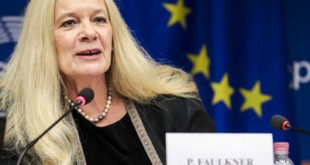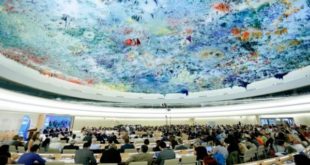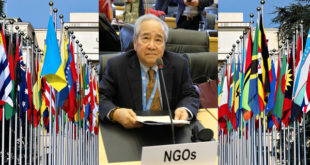
Religious Freedom in Vietnam
Hudson Institute, Center for Religious Freedom
September 12, 2016
Why is religious freedom important, in Vietnam or anywhere else?
The usual answer is that freedom of conscience and religion, or freedom of thought, is the foundation for all other freedoms—freedom of speech or assembly, for example, and political freedom more generally. That is true, I think, but there is another answer I would offer.
What the question of religious freedom illuminates for us is the way in which any government sees itself and the people of the country. A regime that does not permit freedom of thought and belief and worship is one that sees the inhabitants of the country not as citizens, but as suppliers of labor—to use the old term, as a proletariat. It sees them as cogs in the machinery, as automatons whose job is to work, to rally when assembled, and to shout praise of the regime when required. Thought—free thought, freedom of conscience, freedom of religion—would get in the way of all that. In communist systems, individuals have no rights; only the Party has rights.
Recall the words of Trotsky to the XIII Party Congress in 1924:
“The party in the last analysis is always right because the party is the single historic instrument given to the proletariat for the solution of its fundamental problems….I know that one must not be right against the party. One can be right only with the party, and through the party….”
So of course only the Party is permitted to think. To hold beliefs outside those of the Party, to believe there is a cause or a value or a Being above the Party, is a crime.
President George W. Bush used to try to explain to Hu Jintao that the Chinese Communist Party’s fear of religion was wrong because it was impractical and damaging to the nation. He argued to Hu Jintao that any great country had many social problems, and that religious groups addressed these in more successful and less expensive ways than did the government. He pointed to the tens of thousands of hospitals, schools, and orphanages, and old folks’ homes, and all the other services provided by religious groups in the United States. Your society will be safer and richer if you allow religious groups to act freely, Bush argued. And they will not engage in political activity; they will not form a political party or seek power.
Of course that was true: Chinese society would be richer. But in a way Hu was right in thinking that this was dangerous to him even knowing that religious groups would never act politically or seek power. Why? Because religious groups see the individual and his or her freedom and happiness, and the community and its free and harmonious functioning, as the main goals of social activity. So the state exists to serve the people, individually and collectively, and to preserve their right to guide themselves and their families in accordance with their views of the person, of God, and of life itself.
What a terrifying thought for a communist leader, who would of course see such thinking as a challenge to the Party’s right to supply correct views of history, the self, and the community. Here is a microcosm of what they fear, from the report on a recent trip to Vietnam by Professor Mary Ann Glendon of Harvard and Father Thomas Reese, who were members of the United States Commission on International Religious Freedom:
“Government officials become nervous when a local pastor has more credibility and authority in his village than the local party and government officials. For example, when the local officials tell demonstrating villagers to go home, they ignore them; but if pastors say ‘go home,’ they obey.”
That is because the local pastor has moral authority and legitimacy while the party and government officials do not. That is just what the regime fears. That is why the new “Law on Belief and Religion” is really about controlling and circumscribing belief and religion. That is why the Committee on Religious Affairs sits within the Ministry of the Interior. But what the Party officials do not realize is that they lack moral authority and legitimacy precisely because they prevent citizens from having freedom of religion and belief.
The story of religious freedom in Vietnam reflects all of this, and of course its Communist Party leaders cling to the Leninist view of the party’s political role even as they abandon Marxist theories of economics. When it comes to religion, they suppress independent institutions and try to create fake state-owned substitutes.
I am delighted to be here today because this is precisely the moment to discuss these issues —both because we will soon have a new administration in Washington, and because the Vietnamese regime is seeking allies today as it tries to resist threats to its independence from China. President Obama lifted the arms embargo on Vietnam when he visited there in May. The question is whether the United States will use the closer relationship that Vietnamese leaders want to promote religious freedom—or will we forget about it and pursue what is meant to be a policy of realpolitik?
Prof. Glendon and Father Reese noted that some progress on religious freedom has been made since the Communist takeover in 1975, and this gave them hope that improvements are possible. They also stated that “it is also clear that Vietnamese officials want to have good relations with the United States.” And they explained that what happens in Vietnam will have a real impact on freedom of religion throughout Southeast Asia.
The trouble with allegedly realpolitik policies is that they are very often not terribly realistic. Whose independence and strength are we enhancing: that of the Vietnamese people, or that of the Party and regime? Will we be demanding that Vietnam meet the standards to which it is officially pledged as a signer of the International Covenant on Civil and Political Rights, or ignore those requirements?
In fact we know that American pressure can work—to relax the degree of oppression, to reduce the amount of thuggish behavior, to allow some more space for religious groups. It can work—but only if the United States Government applies that pressure and makes it clear that improved relations depend on this. The Vietnamese regime will study this closely. It will reach conclusions about how much we care.
We should care, for reasons of principle: because we believe in freedom of conscience and thought and religion. But we should also care if we wish to see Vietnam develop into a stable society that will be a long-term American ally. We should be urging the regime to stop fearing its own people, to stop acting as if their civic activity is always a threat. We should be urging the Vietnamese regime that it can develop a more harmonious society if they allow the people more freedom of religion. And we should be arguing that the only way for it to acquire to moral authority and legitimacy it seeks is to allow the people of Vietnam more freedom.
Of course they will resist because they will want it all–want American weapons and investment and protection from China–without reducing their control of society, without changing their belief that only the Party is permitted to think, without trusting the Vietnamese people, without allowing freedom of religion.
So the outcome depends in good part on us, in the United States. If we abandon the Vietnamese people the Party will not give an inch. If we press them, and stick to our principles, and make reasonable demands, we know from the last 40 years that they will move—as little as they can, of course, but they will move. The independent variable here is not the Vietnamese regime, whose attitude we can predict. The independent variable is the United States. Will we have the strength of character and belief to struggle for religious freedom in Vietnam?
By acting together as we are today, we can make the answer to that question YES. That must be our goal this year and in the coming years under a new American administration.
Elliott Abrams
Former Assistant Secretary of State for Human Rights
and former Deputy National Security Adviser
 Quê Me Quê Me: Action for democracy in Vietnam & Vietnam Committee on Human Rights
Quê Me Quê Me: Action for democracy in Vietnam & Vietnam Committee on Human Rights



